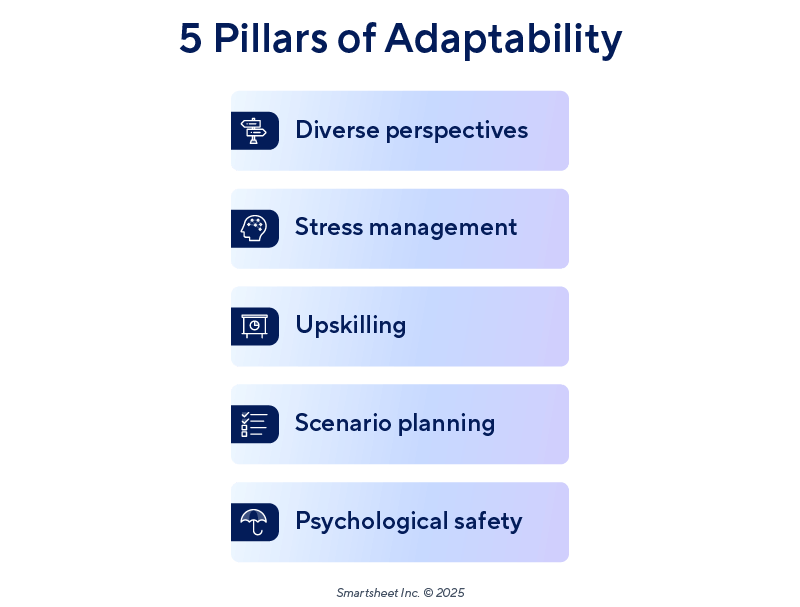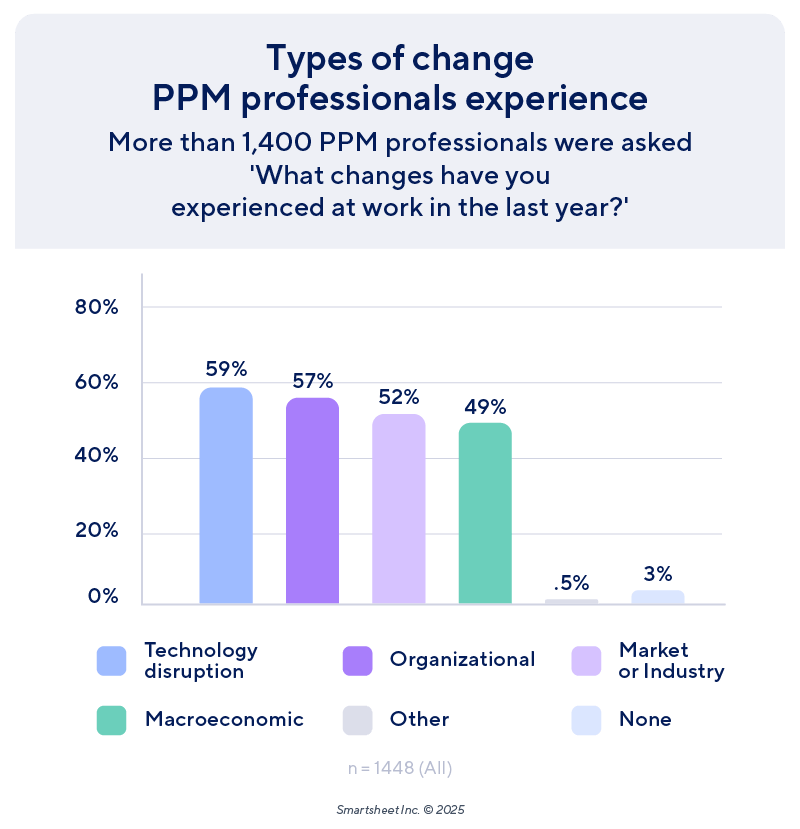The Urgent Need for Adaptability in the Workplace
Adaptability in the workplace is crucial as PPM professionals face nonstop change. Without it, teams face burnout, stress, and scope creep. Adaptability helps teams stay productive, cohesive, and confident — and helps transform chaos into clarity and challenge into opportunity.
Project and portfolio management professionals are no strangers to change, but in recent years, the rate of change has exponentially increased, which makes their jobs more nuanced and difficult. In 2024, Smartsheet surveyed more than 1,400 project and portfolio management professionals and learned that 97% of PPM professionals experienced change at work in 2024, with 70% reporting a “significant” or “moderate” increase in change compared to previous years.
Despite this familiarity with disruption, the ability to adapt remains a challenge: 92% of PPM professionals say adapting to change is still a significant struggle.
- Change From All Directions
PPM professionals today are navigating a whirlwind of change, with disruptions from every direction by forces both internal and external. From rapid technological disruption to organizational shifts and unpredictable market volatility, they’re expected to adapt quickly and lead with clarity amid the chaos.
- The Human Impact: Burnout, Stress, and Scope Creep
This constant change and disruption are taking a toll on PPM professionals: 71% of PPM professionals believe that constant changes in the workplace are making it increasingly difficult to adapt effectively and remain proactive. Employees are dealing with increased burnout, elevated stress levels, and ongoing scope creep as a direct result of struggling to keep up with shifting demands.
When change is constant but the ability to adapt doesn’t keep pace, professionals are left feeling reactive, overwhelmed, and ineffective. Over time, this erodes not only productivity, but confidence, creativity, and team cohesion.
- Adaptability Is Key to Thriving, Not Just Surviving
Though change is inevitable, struggle is not. Developing adaptability in the workplace is essential to regaining control, improving performance, and even enjoying work again.
When PPM professionals build adaptability, they’re not simply surviving workplace change, they’re thriving in it: leading with confidence, making the most of their time at work, and having the energy and focus to enjoy life outside of it.
Why Adaptability Is Critical for Project Managers in Today’s Workplace
Adaptability is a defining trait of effective project and portfolio management professionals. It empowers leaders to make confident decisions amid uncertainty, maintain team morale, manage shifting stakeholder needs, and embrace continuous improvement.
For project and portfolio management professionals, adaptability is more than a nice-to-have trait — it separates resilient leaders from reactive managers. In a role where uncertainty is part of the job, the ability to navigate change with clarity, calm, and creativity is a competitive advantage.
| Inflexible Project Manager | Adaptable Project Manager |
|---|---|
| Sticks to rigid plans | Pivots when needed |
| Creates unnecessary stress | Models resilience |
| Erodes trust | Builds credibility |
| Misses out on innovation | Embraces change |
| Stalls career growth | Stays future-ready |
Here are four core areas where adaptability empowers PPM professionals to lead effectively and sustainably:
- Decision-Making Through Ambiguity: When asked to make high-impact decisions with limited information, adaptable PPM professionals don’t freeze. They assess the data that is available, consult their teams, and make informed choices quickly. They’re comfortable iterating, revising, and pivoting because they believe in progress over perfection in fast-moving environments.
- Team Leadership and Morale: When change happens, teams look to project managers for cues on how to respond. Adaptable project managers model resilience, communicate transparently, and stay solutions-focused, even when circumstances are chaotic. This kind of leadership inspires trust, reduces anxiety, and keeps the team moving forward.
- Stakeholder Management: As project priorities, KPIs, and customer needs shift, project managers must continuously recalibrate expectations and communication. Instead of rigidly defending outdated plans, adaptable project managers engage stakeholders with empathy and flexibility. They listen, propose thoughtful alternatives, and reframe challenges as opportunities for collaboration.
- Continuous Learning and Improvement: Adaptability in the workplace also drives continuous growth and innovation. Adaptable PPM professionals seek feedback, reflect on failures, and evolve their strategies. This growth-oriented approach helps both managers and teams stay aligned with modern practices, emerging tools, and forward thinking.
How to Build Adaptability as a Core Skill in Project Management
Adaptability in the workplace can be developed through practical strategies: fostering psychological safety, planning for multiple outcomes, learning new skills, managing stress, and embracing diverse perspectives. These habits help professionals stay adaptable, make better decisions, and lead teams through change more effectively.
While some people may seem naturally adaptable, the truth is that adaptability is a skill — one that PPM professionals can actively build through intentional practice.
Here are some key strategies for strengthening adaptability as a professional competency:

1. Create a Safe Workspace
Adaptability thrives in environments where people feel it is safe to speak up, take risks, and fail without fear of punishment. When people feel safe, they’re more willing to adapt, iterate, and try new things.
- Encourage Employees to Speak Up: Support team members who share honest feedback and challenge the status quo.
- Allow for Mistakes: Frame mistakes as learning opportunities, not liabilities.
- Encourage Risk-Taking: Lead with the mindset that experimentation leads to innovation.
2. Plan for Multiple Scenarios
Adaptable PMs don’t plan for just one “perfect” path forward — they build out multiple potential paths. Scenario planning helps teams mentally prepare for different outcomes, reducing panic when circumstances inevitably shift.
- Have a Plan B: Map out contingency plans during kickoff.
- Imagine Different Scenarios: Ask questions, such as: What if the timeline gets cut in half? What if we lose a key resource?
- Stay Calm: Use this exercise not to worry, but to build confidence and readiness.
3. Stay Competitive With Continuous Learning
In a world where tools and expectations evolve constantly, staying relevant means staying sharp. Learning new platforms, frameworks, or communication approaches makes adjustments easier when change arrives.
- Expand Tools and Methods: Invest in training for new software, project management tools, or collaboration methods.
- Expand Educational Opportunities: Explore courses or certifications relevant to your work.
- Expand Skill Sets: Encourage your team to grow their skills alongside you.
4. Strengthen Mindfulness and Stress Management
Adaptability is about internal calm as much as it is about external change. The more regulated you are emotionally, the more adaptable you’ll be under pressure.
- Relax: Practice mindfulness, breathing exercises, or movement breaks to stay grounded.
- Reflect: Journal during moments of stress to reflect instead of reacting.
- Reset: Use transitions (before meetings, after a project setback) as “reset” moments.
5. Seek Diverse Perspectives
One of the most powerful ways to become more adaptable is to regularly step outside your own viewpoint. Engaging with diverse teams, stakeholders, or departments can help you see challenges in new ways and come up with more innovative solutions.
- Get Advice: Ask other teams how they’ve handled similar changes.
- Maximize Feedback: Involve stakeholders early and often in project pivots.
- Stay Curious: Build time into your workflow for listening, not just directing.
Build an Adaptable Organization With Real-Time Work Management in Smartsheet
Connect the dots between strategy and execution to deliver value at scale.
Amplify the value of your project portfolios with a platform that combines flexibility, process standardization, and enterprise-class governance. With Smartsheet, you can build projects, automate work, and accelerate time-to-market.
Learn how Smartsheet empowers teams to plan, implement, and scale projects, programs, and portfolios and deliver results faster.
